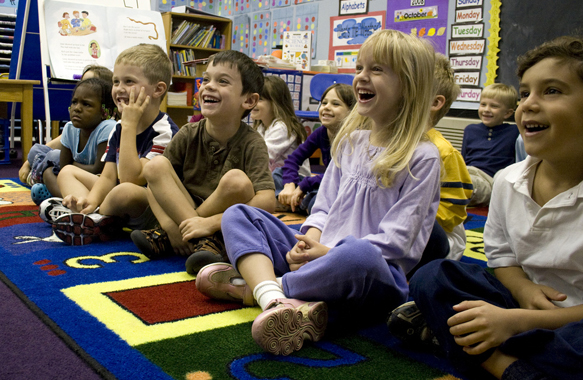Photograph; Opponents of the Common Core State Standards kept their children out of school Nov. 18 to protest what they say is a federal overreach.
Might we blame a bad Common Core State Standards rollout on a website or could it be that the website rollout went so well that people never imagined that Common Core might be bad? Could it be that plan is grand or that making a grand is the plan – there are big dollars to be made with the implementation of Common Core. Whatever your truth, in South Carolina and 17 other states people are prepared to do more than debate the efficacy of CCSS. Today, on what has been christened the “National Don’t Send Your Child to School Day,” children were removed from school. Moms and Dads throughout the nation took a stand.
Opponents say the standards were not researched properly and are a federal overreach
A protest in South Carolina is adding fuel to the fire in the opposition to the controversial Common Core State Standards, as local parents plan to keep their children out of school Monday to rally at the South Carolina Department of Education.
The organization South Carolina Parents Involved in Education dubbed the protest “National Don’t Send Your Child to School Day,” to coincide with the beginning of National Education Week and seeks to start a “revolution in opposition of the Common Core Standards”, according to the group’s website. But the organizers are urging parents across the country to keep their children out of school in protest of the standards, which some see as a federal overreach into state educational policies. A Facebook event for the national protest lists more than 6,000 participants.
Although implementation of the standards started during the 2011-12 school year in South Carolina, this is the first year Common Core will be used for instructional purposes, according to the state education department.
“Common sense tells us Common Core is bad for children, but the school districts and the education authorities in our state are turning a blind eye to the serious flaws in the Common Core Standards,” the group said in a statement. “We are uniting with parents, grandparents and other education stakeholders, across the nation, to let the education establishment know that we are going to protect our children from the perils of Common Core.”
In at least 17 states – including New York, Connecticut, Alaska and West Virginia – parents have reported keeping their children out of school on Monday as a part of the protest.
Although the more rigorous educational standards for English and mathematics are voluntary, opponents say they’re state-led in name only, and that strong support from the federal government – both verbally and in the form of financial incentives through Race to the Top grants – pressured many of the 46 states using them to adopt the standards. Opponents have also said the costs associated with implementing the standards and assessments are problematic.
Still, Secretary of Education Arne Duncan has repeatedly said that such claims are not true.
“Again, it’s just not intellectually honest,” Duncan said in a September conference call with reporters. “Anyone who says that we developed them, or we mandated them or we did whatever, they’re lying. They’re either lying or they’ve been absolutely misled.”
Most recently, Duncan told attendees at a meeting of the Council of Chief State Schools Officers Organization in Richmond, Va., on Friday that much of the opposition to the standards comes from “white suburban moms,” who were not prepared for the results of assessments aligned with the new educational benchmarks, according to Politico.
[ALSO: What High School Parents Should Know About Common Core]A handful of states have already begun administering new state tests aligned to the standards, with less-than-encouraging results.
When New York released the results from its first set of Common Core assessments in August, the scores showed a significant drop in the number of students who scored as proficient. Not even one-third of students in third through eighth grade met or exceeded the standards for math or English.
Similarly, students’ reading scores in Minnesota plummeted in the state’s first assessments aligned with the standards, which were released at the end of August. Students’ scores dropped in both math and English, although the decline was much larger, and in every grade, for English.
But education leaders say that’s just a reflection of the rigor of the new standards, and that people shouldn’t see the drops in scores as a sign that students are doing worse, but rather that the Common Core standards are setting a new baseline for improvement.
“It’s fascinating to me that some of the pushback is coming from, sort of, white suburban moms who — all of a sudden — their child isn’t as brilliant as they thought they were and their [schools aren’t] quite as good as they thought they were, and that’s pretty scary,” Duncan said Friday. “You’ve bet your house and where you live and everything on, ‘My child’s going to be prepared.’ That can be a punch in the gut.”
Still, many are skeptical of the Common Core standards and say they bear similarities to the national testing and “one-size-fits-all” education seen in No Child Left Behind.
Duke Pesta, an English professor at the University of Wisconsin–Oshkosh, said at the South Carolina rally that the Common Core standards are “No Child Left Behind on steroids.”
[Ethan Young, a high school senior in Tennessee, spoke at a Knox County school board meeting Nov. 6 with similar sentiments. In a YouTube recording of Young’s speech, which has since gathered nearly 1.3 million views, the student claims the standards display a “mistrust of teachers” and said “standards-based education is ruining the way we teach and learn,” as they miss the mark when it comes to measuring student achievements in things like creativity and inquisitiveness.
“The product is a ‘rigorous preparation’ for career and college, yet many educators agree that rigorous is a buzz word,” Young said. “These standards aren’t rigorous, just different, designed for an industrial model of school.”
Daniella Koontz, a photographer in Florida, also says she kept her children out of school on Monday in part because she believes the standards inhibit children’s creativity.
“At the moment, my children are at the top of their classes and I’m not afraid of them failing any tests that the government wants to put in front of them,” Koontz said in an email to U.S. News. “My problem is that these tests are all that the teachers can see, and our children’s educations are becoming statistics and scores and numbers. My children are not a number. They are not a test score. They are NOT a statistic.”
Koontz says that although there is a need for a stricter curriculum and higher standards for older students in high school, the standards don’t make sense for younger children, who still learn at different speeds and in different manners.
“America needs inventive minds, free thinkers, and people not afraid to push the envelope and ask, ‘why’ or ‘how far’ or ‘what if?'” Koontz says. “When imagination is taken away, we are one step closer to being human robots that can only operate when given directions.”
In South Carolina, several educators and politicians are scheduled to speak in opposition to the standards, including a teacher from Georgia who says she left her job because of Common Core, and state Sen. Lee Bright, who is sponsoring a bill to outlaw Common Core in South Carolina.
[SEE ALSO: Majority of Teachers Support Common Core, Poll Finds]However, other sponsors of the bill, including state Sen. Larry Grooms and state Rep. Eric Bedingfield, have said they disapprove of Monday’s protest, according to South Carolina newspaper The State.
“I’m not one that would urge a parent to keep your child out of school,” Grooms said. “Whether we move forward or do not move forward with Common Core, that should be debated.”












Leave A Comment